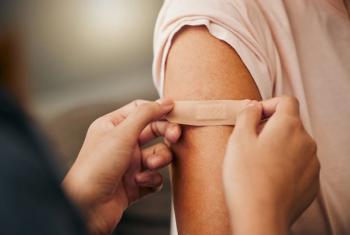
The Impact of COVID-19 on Children
William J. Muller, MD, PhD; and Paul A. Offit, MD, discuss the impact of COVID-19 on children.
Episodes in this series

William J. Muller, MD, PhD: Hello and thank you for joining this Contemporary Pediatrics® video series. I’m Dr William J. Muller, I’m an attending physician for infectious diseases at the Anne & Robert H. Lurie Children’s Hospital of Chicago, Illinois, and an associate professor of pediatrics and infectious diseases at Northwestern University Feinberg School of Medicine. I’m also the scientific director for community and clinical trials at the Stanley Manne Children’s Research Institute. And I’m joined today by Dr Paul A. Offit, who is the director of the Vaccine Education Center and a professor of pediatrics in the division of infectious diseases at the Children’s Hospital of Philadelphia in Pennsylvania. And we’re here today to focus on a discussion of COVID-19 vaccines in children, and also to talk about how to overcome some barriers to pediatric COVID-19 vaccination. And I think 1 of the topics that many of us are going to be interested in delving into a little bit is the data for children under the age of 5 years. To get started, I think it’s probably worth giving some context on the rates of infection, hospitalization, and how severe COVID-19 is among children. I don’t know if Dr Offit wants to comment on what we know about COVID-19 in children, and why it’s important to consider vaccines for this age group.
Paul A. Offit, MD: Sure. I think the mantra since this virus came into this country, in early 2020, was that children get infected less frequently, and when they’re infected, they’re infected less severely. To some extent, that’s largely true, but they can be infected. If you look at, for example, who dies, but roughly 80% of the deaths are in people older than age 65 years, probably 93% of people older than age 55 years, there’s been about 1000 deaths in children younger than 18 years of age, which is 0.1% of all deaths. But, if you look just at children younger than 5 years of age, over the past 2 years, there’s been 45,000 hospitalizations, and 1 out of every 4 of those hospitalizations has resulted in intensive care unit admission. Thus, about 10,000 children during those 2 years, who were younger than 5 years have been not admitted to the intensive care unit and about 450 who have died. Interestingly, about two-thirds of those children had no known comorbidity, so when people say, “Well, sure children can suffer this disease, but it’s really the children who are at highest risk,” that’s not true. The virus can certainly infect seriously, otherwise healthy young children. Thus, for that reason, if we can make a safe vaccine to protect those children, then we should protect them.
William J. Muller, MD, PhD: And I think there’s also emerging data from the CDC [Centers for Disease Control and Prevention] and other places that would suggest that vaccination really significantly decreases the risk of both hospitalization, and I guess there may not be enough data for death, but for severe illness among children who may be at risk for developing some complications with COVID-19 infection. I think that’s sort of an argument for the need for vaccination in this population. Do you think there’s any extent to which some of the mitigation measures may have decreased the amount of disease we saw in children early on, that may influence some of the perceptions of a decrease in severity or extent of infection?
Paul A. Offit, MD: Definitely, we closed businesses, we closed schools, we socially distanced, we masked, we restricted travel, we closed business. Look at what happened to other respiratory viruses, viruses like respiratory syncytial virus, influenza virus, human metapneumovirus, the 4 strains of human coronaviruses really just stopped circulating. In our hospital, where normally in the winter months we see influenza, we see respiratory syncytial virus, we see human coronavirus. However, we didn’t see anything so that showed you how effective that was. Obviously, we were still seeing COVID-19, but imagine how much worse that would have been, had we not done those mitigation measures.
William J. Muller, MD, PhD: For sure. In our hospital, every pediatrician is familiar with the surges of RSV [respiratory syncytial virus] infection in the wintertime, and I believe we went the entire winter, without more than five cases of RSV. Hence, it was pretty clear that a lot of what we were doing was preventing the spread, not just of COVID-19, but also of other respiratory viruses. But, as we start to lift some of those restrictions, we’re probably going to start to see more infections in children, and there’s another reason to, I think, have available the protection that is provided by a vaccine.
Transcript Edited for Clarity
Newsletter
Access practical, evidence-based guidance to support better care for our youngest patients. Join our email list for the latest clinical updates.










